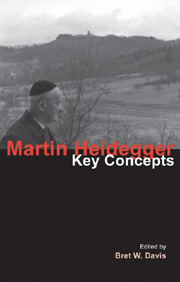Book contents
- Frontmatter
- Contents
- Contributors
- Acknowledgements
- Abbreviations
- Introduction: key concepts in Heidegger's thinking of being
- 1 Hermeneutics of facticity
- 2 Phenomenology: Heidegger after Husserl and the Greeks
- 3 Dasein as being-in-the-world
- 4 Care and authenticity
- 5 Being and time
- 6 The turn
- 7 Heidegger, National Socialism and the German People
- 8 Truth as alētheia and the clearing of beyng
- 9 The work of art
- 10 Ereignis: the event of appropriation
- 11 The history of being
- 12 Will and Gelassenheit
- 13 Ge-stell: enframing as the essence of technology
- 14 Language and poetry
- 15 The fourfold
- 16 Ontotheology and the question of god(s)
- 17 Heidegger on Christianity and divinity: a chronological compendium
- Chronology of Heidegger's life
- Bibliography
- Index
5 - Being and time
- Frontmatter
- Contents
- Contributors
- Acknowledgements
- Abbreviations
- Introduction: key concepts in Heidegger's thinking of being
- 1 Hermeneutics of facticity
- 2 Phenomenology: Heidegger after Husserl and the Greeks
- 3 Dasein as being-in-the-world
- 4 Care and authenticity
- 5 Being and time
- 6 The turn
- 7 Heidegger, National Socialism and the German People
- 8 Truth as alētheia and the clearing of beyng
- 9 The work of art
- 10 Ereignis: the event of appropriation
- 11 The history of being
- 12 Will and Gelassenheit
- 13 Ge-stell: enframing as the essence of technology
- 14 Language and poetry
- 15 The fourfold
- 16 Ontotheology and the question of god(s)
- 17 Heidegger on Christianity and divinity: a chronological compendium
- Chronology of Heidegger's life
- Bibliography
- Index
Summary
At first – before this “first” was generated or the “after” was wanted – time was not, but was at rest with itself in what is, and itself kept quiet in what is. But there was a busy, active nature, wanting to rule itself and be its own, choosing to seek more than the present, that moved itself, and time moved too; and always moving on to the “next” and the “later” and to what is not the same but one after another, we turned our journey into a long stretch and fabricated time as an image of eternity. For there was an unquiet power of soul that always wanted to transfer what it saw there into something else, that was unwilling for the whole to be present to it all at once.
(Plotinus, Enneads 3.7.11)The human being is a creature of distance! And only by way of the real primordial distance that the human in his transcendence establishes toward all beings does the true nearness to things begin to grow in him.
(Heidegger, MFL 221)Plotinus and Heidegger – one of the greatest Platonists and a philosopher who viewed Platonism as a colossal dead end – have this in common: for them, time is not simply an aspect of change, or a subjective framework for perceiving change. Time is rooted in our very essence, in our concern with our own being. For us, our existence is at issue: we are faced with the task of making someone of ourselves, of deciding who and how to be.
- Type
- Chapter
- Information
- Martin HeideggerKey Concepts, pp. 69 - 81Publisher: Acumen PublishingPrint publication year: 2009
- 1
- Cited by

